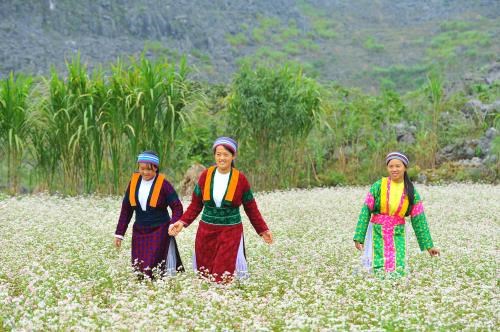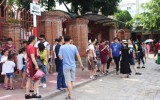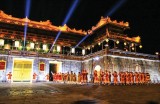Ha Giang province awaits tourism boom

Ha Giang province in buckwheat flower season - Illustrative photo (Photo: VNA)
The northeastern border province of Ha Giang boasts majestic scenery, geological features, a diverse eco-system, rare fauna and flora, and the unique cultures of 22 ethnic minorities, but has yet to realise its enormous tourism potential, tourism officials said.
The province has seen average annual growth of 32 percent in the number of tourist arrivals in the past few years, said Nguyen Van Son, Chairman of the provincial Ha Giang People’s Committee.
Last year arrivals numbered nearly 854,000, including 176,500 foreigners.
Revenue from tourism was estimated at 795 billion VND (35 million USD), a year-on-year increase of 13 percent.
In the first six months of this year, there were more than 470,000 tourists, with visitors from Ho Chi Minh City accounting for 35 percent.
But, speaking at recent event to promote Ha Giang as a tourist destination in HCM City, Son said: “The province’s tourism sector is at an early stage of development and faces obstacles like limited human resources and infrastructure.”
“The province promises to offer favourable conditions for domestic and international investors to develop tourism projects.”
Tran The Dung, deputy director of Young Generation – a tourism company in HCM City, said the province should offer other tourism products besides the Dong Van Karst Plateau Geopark to attract more tourists.
He suggested adventure travel in the Tu San alley area, Hoang Su Phi terraced fields, the Gam River and festivals of ethnic groups.
The province’s tourism authorities should develop closer co-operation with travel agents and inform them early about activities like festivals to enable them to make tour plans, he added.
In October 2010 the geopark was recognised as a member of the Global Geopark Network, the first in Vietnam and second in Southeast Asia to achieve the status.
It covers an area of 2,356sq.km and with an average altitude of 1,400-1,600 metres, enjoys a cool climate and a range of different terrains.
There are many grand, deep canyons. Ma Pi Leng Pass, recognised as the deepest canyon in Vietnam, is 700-800m deep and 1.7 km long.
Lung Cu flagpole, the northernmost point of Vietnam, is a must-see tourism destination for not only Vietnamese overseas who come back for a visit but also for many locals across the country.
The Hoang Su Phi terraced fields, recognised as national heritage, is considered one of the most beautiful landscapes in the whole country.
Khau Vai love market, where people can meet up with their old flames for a chat takes place once a year on the evening of 26th and morning of 27th in the third lunar month in Meo Vac district’s Khau Vai commune. Due to excessive tourism and intruding photographers, locals said they have moved further to find their own quiet space to meet up with their once loved-ones.
With its inherent appeal, the market has become a unique cultural identity of the ethnic minorities in the region.
The province hopes to welcome 1.5 million tourists by 2020, including 600,000 foreign visitors.
VNA
 2025 Nha Trang – Khanh Hoa Sea Festival to spotlight cultural heritage space
2025 Nha Trang – Khanh Hoa Sea Festival to spotlight cultural heritage space
Vietnam, a unique destination attracting Indian tourists: Indian newspaper
 Cao Bang eyes new opportunities for cross-border tourism development
Cao Bang eyes new opportunities for cross-border tourism development
 Kien Giang strives to attract tourists to finish the year on high note
Kien Giang strives to attract tourists to finish the year on high note
 Rivers provide major resources to boost Vietnam’s tourism
Rivers provide major resources to boost Vietnam’s tourism
 Dong Thap plants over 100 ha of flowers for Tet
Dong Thap plants over 100 ha of flowers for Tet
 Donghai Airlines launches direct route to Khanh Hoa
Donghai Airlines launches direct route to Khanh Hoa
 “Carbon footprint” reduction needed for sustainable tourism development: insiders
“Carbon footprint” reduction needed for sustainable tourism development: insiders
Vietnam's tourism likely to boom under 'Six Countries, One Destination' visa initiative
 Promoting tourism through competitions: A channel to spread the beautiful image of Binh Duong’s land and people
Promoting tourism through competitions: A channel to spread the beautiful image of Binh Duong’s land and people




